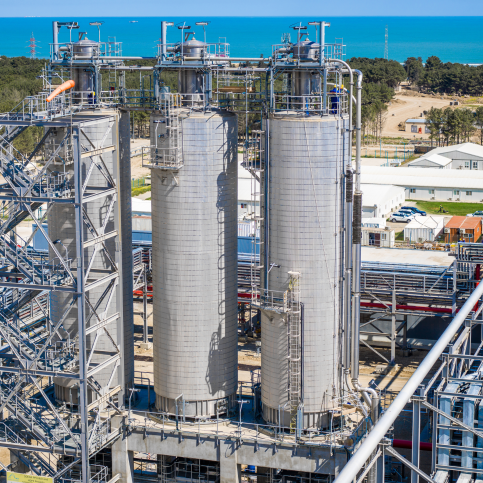Processing Technologies: Pioneering Innovation for a Sustainable Future
Table of Contents
- Introduction to Processing Technologies
- What Are Processing Technologies?
- Advancements in Oils and Fats Processing
- Cutting-Edge Extraction Methods
- Refining for Enhanced Purity
- Sustainable Processing Practices
- The Role of Digital Integration in Processing Technologies
- Automation for Precision and Efficiency
- Data Analytics and Process Optimization
- Smart Technologies and AI-Driven Solutions
- The Future of Processing Technologies
- Meeting Consumer Expectations
- Driving Sustainability in Manufacturing
- Innovations Shaping Tomorrow’s Industries
- Technoilogy’s Expertise in Processing Technologies
- Conclusion
Introduction to Processing Technologies
Processing technologies play a vital role in modern industry, transforming raw materials into high-quality products that fuel economies and support daily life. Whether in food production, energy, or chemical processing, these technologies ensure efficiency, safety, and sustainability in industrial manufacturing.
As global demand for refined, sustainable, and high-performance products continues to grow, companies are investing in advanced processing methods that enhance quality, minimize waste, and optimize resource utilization. The integration of automation, artificial intelligence, and sustainable techniques is revolutionizing production systems, paving the way for a more efficient and environmentally responsible future.
What Are Processing Technologies?
Processing technologies encompass a wide array of methods, machinery, and techniques used to refine and convert raw materials into market-ready products. These technologies are essential in multiple industries, including:
- Food and Beverage – Ensuring the safety, purity, and nutritional value of consumer products.
- Energy and Biofuels – Improving efficiency in oil refining, biodiesel production, and alternative energy development.
- Chemical Processing – Enhancing the synthesis and purification of industrial chemicals, pharmaceuticals, and specialty compounds.
With advancements in digital automation and smart processing, industries can now produce higher-quality outputs while maintaining lower costs and a reduced environmental footprint.
Advancements in Oils and Fats Processing
The oils and fats industry has witnessed remarkable technological progress, focusing on higher efficiency, improved purity, and sustainability.
Cutting-Edge Extraction Methods
To maximize oil yield and quality, modern extraction techniques now include:
- Supercritical Fluid Extraction (SFE) – Uses CO₂ under high pressure to extract oils without chemical residues, preserving nutritional integrity.
- Advanced Solvent Extraction – Improves efficiency in large-scale oil processing, optimizing yield and purity.
Refining for Enhanced Purity
Refining technologies are becoming more precise and environmentally friendly, utilizing:
- Molecular Distillation – A high-precision method to remove contaminants and volatile compounds, ensuring high-purity oil.
- Enzymatic Refining – Uses biological catalysts to improve nutrient retention and minimize the need for chemical treatments.
Sustainable Processing Practices
The push for sustainability in processing technologies has led to:
- Energy-efficient refining techniques, reducing fuel and electricity consumption.
- By-product utilization, turning waste materials into biofuels, animal feed, and industrial applications.
- Lower environmental impact, with advanced filtering systems to reduce emissions and water waste.
These innovations ensure that oil processing remains efficient, cost-effective, and environmentally responsible.
The Role of Digital Integration in Processing Technologies
The rise of Industry 4.0 has brought smart automation and data-driven solutions to processing industries, leading to higher efficiency, real-time monitoring, and predictive maintenance.
Automation for Precision and Efficiency
Modern processing facilities employ automated systems that:
- Enhance precision, reducing human error and ensuring consistent product quality.
- Increase throughput, streamlining production lines for higher output and efficiency.
- Reduce operational costs, optimizing energy use and raw material consumption.
Data Analytics and Process Optimization
Advanced data analytics now allows manufacturers to:
- Monitor real-time processing conditions to maintain optimal product quality.
- Identify efficiency bottlenecks and improve resource utilization.
- Predict maintenance needs, reducing downtime and repair costs.
Smart Technologies and AI-Driven Solutions
IoT (Internet of Things) sensors, AI algorithms, and predictive modeling are revolutionizing processing technologies by:
- Enhancing operational efficiency through real-time monitoring and self-regulating processes.
- Optimizing production forecasting, reducing material waste and improving yield accuracy.
- Facilitating remote monitoring, allowing for seamless 24/7 facility supervision.
By integrating AI-driven technologies, industries can minimize resource consumption while achieving higher-quality, precision-driven results.
The Future of Processing Technologies
Meeting Consumer Expectations
Consumers today demand high-quality, transparent, and sustainable products. Processing technologies must ensure:
- Safe and clean production methods, reducing chemical exposure.
- Nutrient retention, particularly in food and health-related industries.
- Sustainability, meeting global regulatory standards for eco-friendly processing.
Driving Sustainability in Manufacturing
Future processing technologies will continue to:
- Reduce industrial waste through improved recycling and material recovery.
- Lower carbon footprints, utilizing renewable energy sources and energy-efficient processes.
- Enhance supply chain transparency, ensuring ethical sourcing and responsible production.
Innovations Shaping Tomorrow’s Industries
From nanotechnology in material refinement to blockchain-based traceability in supply chains, future processing advancements will reshape industries by:
- Enhancing product purity through next-generation refining techniques.
- Boosting production speeds with AI-powered automation.
- Minimizing waste and maximizing efficiency through circular economy principles.
The future of processing technologies is defined by precision, sustainability, and innovation, ensuring that industries continue to meet the evolving needs of consumers and global markets.
Technoilogy’s Expertise in Processing Technologies
Technoilogy remains at the forefront of cutting-edge processing technology, offering solutions that:
- Optimize production efficiency through state-of-the-art automation.
- Enhance sustainability efforts, reducing waste and energy consumption.
- Ensure industry compliance, meeting global standards for food, chemical, and energy processing.
Through continuous innovation and expertise, Technoilogy helps industries implement advanced processing solutions that drive efficiency, profitability, and sustainability.
For more information, visit:
Technoilogy Processing Technologies
Conclusion
Processing technologies are the backbone of modern industry, driving advancements in efficiency, product quality, and sustainability. From oil refining and food production to high-tech chemical processing, innovation continues to elevate the standards of manufacturing.
As industries embrace automation, data-driven optimization, and sustainability-focused advancements, processing technologies will play a crucial role in shaping the future. With companies like Technoilogy pioneering advanced solutions, manufacturers can remain competitive, efficient, and aligned with global sustainability goals.

